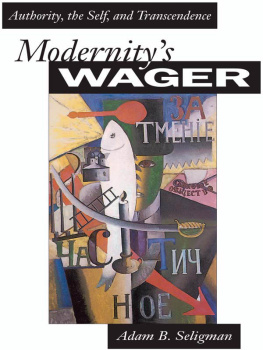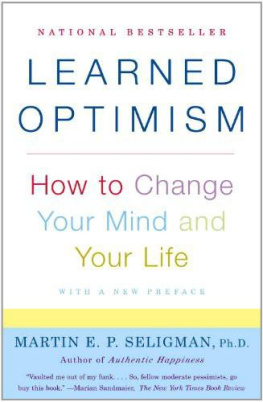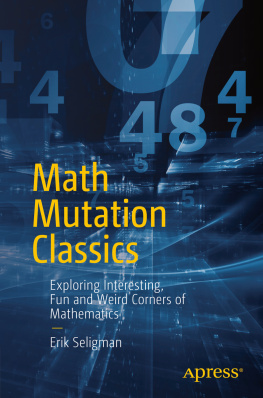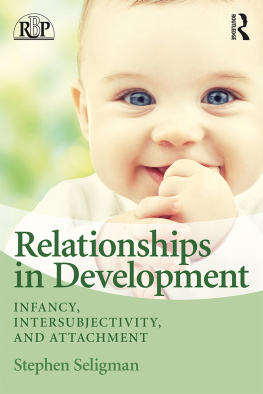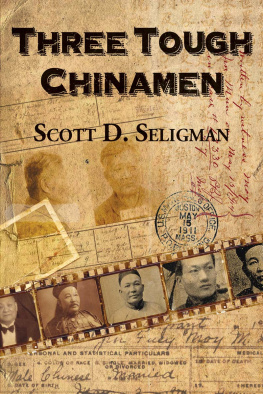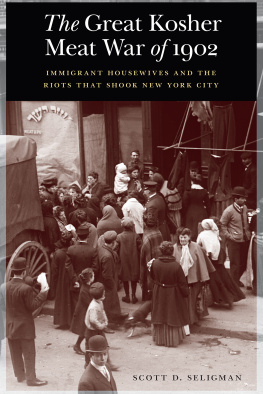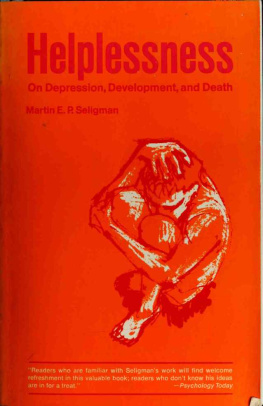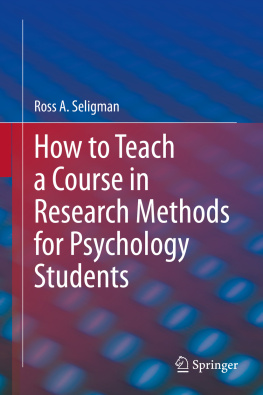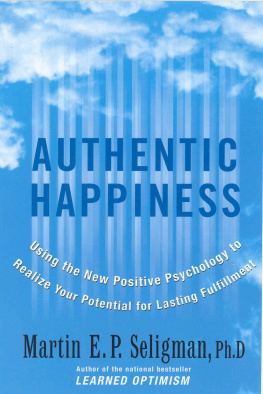Modernitys Wager
Modernitys Wager
AUTHORITY, THE SELF,
AND TRANSCENDENCE
Adam B. Seligman
PRINCETON UNIVERSITY PRESS
PRINCETON AND OXFORD
Copyright 2000 by Princeton University Press
Published by Princeton University Press, 41 William Street,
Princeton, New Jersey 08540
In the United Kingdom: Princeton University Press,
3 Market Place, Woodstock, Oxfordshire OX20 1SY
All Rights Reserved
Library of Congress Cataloging-in-Publication Data
Seligman, A.
Modernitys wager: authority, the self, and transcendence.
p.cm.
Includes bibliographical references and index.
eISBN: 978-1-40082-469-4
1. Authority. 2. Self. 3. Transcendence (Philosophy).
I. Title.
HM1251 .S45 2000
303.3'6dc2100-027418
This book has been composed in Baskerville
The paper used in this publication meets the minimum requirements
of ANSI/NISO Z39.48-1992 (R1997) (Permanence of Paper)
www.pup.princeton.edu
Printed in the United States of America
1 3 5 7 9 10 8 6 4 2
I have not written this book to teach the reader anything new. Rather is it my aim to direct his attention to certain well known and generally accepted truths, for the very fact that they are well known and generally accepted is the cause of their being overlooked.
Moses Hayyim Luzzatto, Mesillat Yesharim
CONTENTS
PREFACE AND ACKNOWLEDGMENTS
AUTHORITY and the need for authority are irrevocable aspects of self and of the human condition. This remains the case even after more than a century of belief in the secular, democratic message of modernity. The following is an attempt to come to terms with this truth as well as to explain the particular difficulties we moderns have with the idea of authority. In fact, the idea of authority is so inimicable to the assumptions of most secular Western intellectuals that we have lost our ability to understand its continuing force in so many parts of the world, including our own. Establishing the connection of authority to certain critical aspects of self-identity will, I hope, contribute to a greater understanding of authority and its continuing resonance in todays world.
There is a wonderful sentence at the very end of Martin Holliss Reasonin Action where he posits the epistemological unity of mankind which involves recognizing that the actors moral identity is at stake in every action. While I am not convinced that this is true of every action it could nevertheless be the guiding epigram for this book. For in making the argument for authority and for the need to take authority seriously in any account of the self, I am indeed invoking an epistemological unity to human experience. Modern, rational, calculative, and post-Cartesian individuals no less than traditional, communal, and collectively constituted individuals all rest their sense of self on an external, expressive, and authoritative set of assumptions and moral orientations. In Sources ofthe Self, Charles Taylor notes how selfhood and morality are inextricably intertwined. Here, I stress the authority of the moral and how certain ideas of selfhood can in fact vitiate that authority and with it any idea of morality. In a word, the argument which follows is that, without a sacred locus of self, any attempt to account for action cannot rise beyond the purely calculative, power-orientated acts of utility maximization. If the self has a sacred locus, however, then it must be an authoritative one as well, for what is the sacred if not authoritative? Though the above sentences are no doubt tautological, that does not as such make them any less true, and to engage the debate over ends and means that inheres in all arguments over tautology would in fact be to beg the fundamental questions of the following chapters.
Originating from within the social sciences, the argument of these chapters necessarily goes beyond them, though just how far short of theology it falls I am not sure. From the writings of Marcel Gauchet in TheDisillusionment of the World to a renewed interest in the works of Leo Strauss, a new sensitivity or at the very least curiosity about issues of authority does seem to have returned to the workshops of the social scientists and other laborers in the smithy of the mind. Indeed, the contemporary debate over Strausswas he a Jewish philosopher or a philosopher who happened to be Jewish?is one that Strauss himself would have recognized as about the respective places of philosophy and revelation and is itself an indication of these stirrings. Similarly, recent works such as ODonovans attempt to create a modern Christian political theology (in his Desire of the Nations) or the four-volume reader on rabbinic political thought that Michael Walzer and others are publishing (and whose first volume is dedicated to the theme of authority) are, I believe, all indications of this trend.
Ultimately, I take these as indicators or illustrations of the thesis worked out in the following pages, that a purely autonomous and atomistic view of the self is insufficient, not only on the prescriptive level, but equally on the descriptive level, incapable finally of giving a proper account of human action in the world. For that we must return to that concept we moderns so instinctively reject, to the idea of authority as an essential aspect of life in the world. As noted by Philip Rieff, who was exquisitely sensitive to the issues analyzed here, From authority itself there is no escape. And once having recognized that, we must begin the laborious work of answering its call, but without retreating from the rule of reason, without which we would be condemned to the most Goyaesque of dreams.
My own understanding of these issues has been greatly influenced by years of continual debate with my social choice nemesis, Mark Lichbach. I am grateful for his ongoing critique. Both John Holmwood and Shlomo Fischer found the time to read the text carefully and comment on it sagaciously. My debt to them both only grows with the passage of time. Paula Fredriksen has done her best to keep me from making too many egregious mistakes in my interpretation of Paul, as Jonathan Imber has in my presentation of social theory. It would be a poorer effort but for their help. The importance of the problem of moral luck and related issues to the concerns of authority and the self developed from a series of most stimulating conversations with Luis Castro Leiva, first in Caracas and then in Boston. His sudden and tragic passing this past year leaves us all much diminished both as scholars and as citizens. Shmuel Eisenstadt kindly found the time to read and comment on the whole of the manuscript with his usual and extraordinary percipiency. As in the past, my colleagues at the Institute for the Study of Economic Culture at Boston University have continued to provide an environment of both careful criticism and intellectual nourishment. Some of the arguments developed in chapter five first appeared in Society (36, no. 5 [1999]: 78). Finally, I would like to thank all the participants in the two Toleration Project workshops in Berlin and Vienna (where the issues dealt with in chapter five were hammered out), who provided the depth and grace necessary to begin rethinking our received wisdom on the issue of toleration.
It was eighteen years ago in Jerusalem that I began my work, essentially as an apprentice in sociology, with the old question of Werner Sombart: Why is there no socialism in the U.S.A.? In the early 1980s that question maintained the same resonances it had had from the beginning of the century. Today, by centurys end, however, the very cognitive, moral, and social contexts within which the question was posed for nearly one hundred years no longer make sense. They simply do not exist. So complete was its failure that few even recall the dream.
Next page
